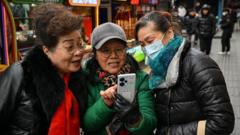Is China's Biggest Shopping Event Kicking Off Early to Boost Spending?

Published: 2025-10-17 04:00:20 | Category: technology
Singles' Day, celebrated annually on 11 November, is China's biggest online shopping event. This year, however, retailers have started their sales earlier, in mid-October, to stimulate consumer spending amid a challenging economic environment. With rising youth unemployment, a prolonged property crisis, and ongoing trade tensions with the US, Chinese consumers are increasingly cautious about their spending habits.
Last updated: 14 October 2023 (BST)
Key Takeaways
- Singles' Day started on 11 November but has expanded to include promotions from mid-October.
- China's economy faces challenges like high youth unemployment and a property crisis.
- Retailers are using deep discounts and AI tools to attract shoppers.
- Luxury brands are seeing a decline in sales, although optimism is rising among investors.
- Government initiatives aim to boost consumer spending through subsidies and wage increases.
The Evolution of Singles' Day
Originally initiated by Alibaba in 2009, Singles' Day has transformed from a niche celebration into a global shopping phenomenon, similar to Black Friday and Amazon's Prime Day. The event began as an anti-Valentine's Day celebration for singles, but has since morphed into a major retail event attracting consumers nationwide.
Over the years, the shopping window for Singles' Day has extended significantly. What used to be a single day of sales is now a multi-week event, allowing retailers to maximise their reach and engage more consumers. This year, the sales campaigns officially commenced in mid-October, coinciding with the end of China's Golden Week holiday, a popular travel and shopping period.
The Current Economic Climate in China
China's economy is currently facing significant hurdles. Youth unemployment rates have surged, and the country is grappling with a prolonged property crisis. These factors, combined with steep government debt and an ongoing trade war with the United States, have led to cautious consumer behaviour.
As a result, many Chinese consumers are re-evaluating their spending habits. The Covid-19 pandemic has permanently altered shopping behaviours, with many opting for savings over discretionary spending. Retail sales growth has not met government expectations despite substantial efforts to encourage spending.
Government Response to Economic Challenges
In response to the downturn, the Chinese government has implemented several initiatives to stimulate consumer spending. These include:
- Direct family subsidies to support households.
- Increased wages in some sectors to enhance disposable income.
- Discounts on consumer goods to encourage purchases.
Despite these measures, retail growth remains sluggish. The government’s ability to stimulate the economy effectively will be crucial in the coming months, especially as the nation approaches the critical shopping season.
Retail Strategies for Singles' Day 2023
Retailers are adapting their strategies to attract consumers during this year’s Singles' Day. Major platforms like Taobao, JD.com, and Douyin are heavily promoting their “11.11” sales through various marketing channels, including app banners and targeted advertisements.
Alibaba, the pioneer of Singles' Day, has announced the launch of its "11.11 Global Shopping Festival" starting from 15 October. This year, the company is leveraging artificial intelligence to enhance the shopping experience. AI tools are being used to improve search functionalities and offer personalised product recommendations, helping consumers navigate the vast array of products available.
Impact on Consumer Spending Behaviour
The economic landscape has led to a noticeable shift in consumer spending patterns. With cautious optimism, many consumers are expected to be more selective about their purchases. This trend has particularly affected high-end retailers, with brands such as Louis Vuitton and Burberry reporting declining sales in China, which is a significant market for luxury goods.
Nevertheless, there is a glimmer of hope for recovery. Recent weeks have seen an uptick in investor confidence, with luxury shares, including those of LVMH and Moncler, witnessing increases. This may suggest a potential rebound in consumer demand, possibly influenced by promotional events like Singles' Day.
The Role of Technology in Shopping
As consumers become more tech-savvy, retailers are increasingly relying on digital solutions to enhance the shopping experience. The integration of artificial intelligence and machine learning into e-commerce platforms allows for better inventory management, targeted marketing, and improved customer service.
For instance, AI-driven algorithms analyse consumer behaviour to predict trends and preferences, allowing retailers to stock items that are more likely to sell. This not only benefits retailers through improved sales but also enhances the consumer experience by providing more relevant options.
Looking Ahead: What’s Next for Singles' Day and Retail in China
The current economic challenges in China present both obstacles and opportunities for retailers. As Singles' Day approaches, the effectiveness of promotional strategies will be put to the test, with both consumers and businesses keenly watching the outcomes.
Future trends may include:
- Increased focus on sustainability and ethical consumerism.
- Greater integration of online and offline shopping experiences.
- Continued emphasis on technology-driven solutions to improve customer engagement.
As we move closer to Singles' Day, retailers will need to remain agile, responding to changing consumer preferences while also navigating the economic landscape. The outcomes of this year’s event could provide valuable insights into the future of retail in China.
FAQs
What is Singles' Day in China?
Singles' Day is an annual shopping event in China, celebrated on 11 November, originally created by Alibaba. It features massive discounts and promotions from various retailers.
Why did Singles' Day sales start earlier this year?
This year, retailers began their Singles' Day sales in mid-October to stimulate consumer spending amid economic challenges, coinciding with the end of China's Golden Week holiday.
How are retailers preparing for Singles' Day 2023?
Retailers are launching extensive marketing campaigns, offering significant discounts, and utilising AI technology to enhance the shopping experience by providing personalised recommendations.
What economic factors are affecting consumer spending in China?
High youth unemployment, a prolonged property crisis, and ongoing trade tensions with the US have led to cautious spending habits among Chinese consumers.
Are luxury brands affected by Singles' Day?
Yes, luxury brands have reported declining sales in China, which significantly impacts their global revenue, but investor optimism is rising, suggesting potential recovery.
As Singles' Day approaches, the interplay between consumer behaviour and retail strategies will be crucial to watch. With economic uncertainties lingering, the outcomes may set the tone for the future of retail in China. #SinglesDay #ChinaRetail #EcommerceGrowth



